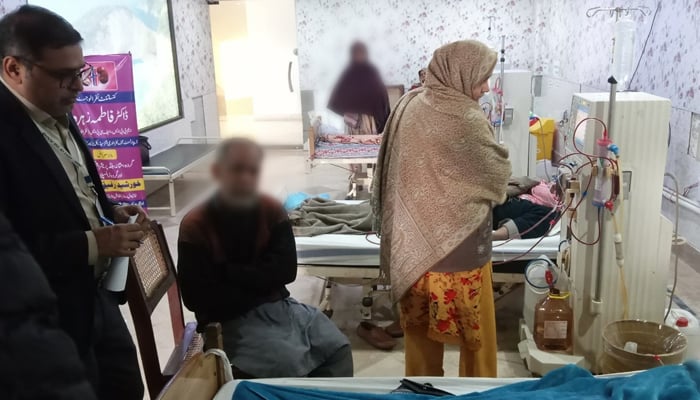Health Card co-payment raised by 10pc
Punjab government revised % of claim co-payment from 40% to 50% for all applicable procedures from tomorrow (Tuesday) in all private impaneled hospitals
LAHORE:The Punjab government has further increased co-payment by 10% under Sehat Sahulat Programme thus equalising the government’s and patient’s contribution to half each for procedures in private sector.
In what is termed as a long-term financial sustainability of the programme Phase-III / Universal Health Insurance, also known as the Health Card, in the province, the Punjab government revised the percentage of claim co-payment from 40% to 50% for all applicable procedures from tomorrow (Tuesday), in all private empanelled hospitals.
Punjab Health Initiative Management Company (PHIMC), in continuation to the intervention of claims co-payment across various procedures at private empanelled hospitals, directed State Life Insurance Corporation of Pakistan (SLIC) to take actions to ensure the timely implementation of the revisions in co-payment percentage.
The PHIMC, on the recommendation of Standing Committee of the Cabinet on Universal Health Insurance, first, imposed 30% co-payment on 01.09.2023, which was later raised to 40% for all procedures being performed at private empanelled hospitals with effect from 15.09.2023.
In previous notification, dated 12.09.2023, PHIMC exempted various services from co-payment, including oncology, dialysis, ICU / CCU / NlCU / HDU / Ventilator medical, thalassemia, orthopedics/neuro trauma cases only. The exemption included all emergency, life-threatening cases as well as to the beneficiaries aged 65 years and above except for cardiology-related treatments.
However, the latest notification, dated 10.01.2024, does not indicate any such exemptions. PHIMC CEO Dr Ali Razzaque claimed that PHIMC imposed 50pc co-payment by the patients against negotiated rates to discourage the misuse of the free treatment facility in private sector, it fails to reap dividends in the public sector as the monthly earning of Punjab’s teaching hospitals on Health Card Scheme considerably dropped despite payment of premium for scheduled procedures. The SHC&MED statistics revealed that the Health Card claims could not exceed Rs1.5 billion per month at each teaching hospital during in the last six months of previous year.
While the Punjab govt paid a premium of Rs100 billion to SLIC, the govt hospitals were supposed to generate revenue through Health Card. The hospitals were supposed to generate Rs40 billion annually, but they failed due to their inability to perform required number of surgeries by optimally discharging services through Health Card. Tertiary care teaching hospitals registered, at least, Rs1bn loss per month by not doing enough procedures under Health Card despite payment of premium of Rs100bn for the same by the Punjab govt.
Consequently, the hospitals are demanding additional budgets from health dept, but Finance Dept showed reluctance. Resultantly, the patients are suffering in hospitals.
Talking to The News, the caretaker Health Minister Dr Javed Akram said that the Punjab government had implemented effective policies which reduced its liabilities to Rs45 billion per year in comparison to previous government’s outstanding sum of Rs150 billion per annum owed to the insurance company; the govt had reversed the previous ratio of share of 70:30 to doctors and hospitals respectively, which had considerably improved services in public sector hospitals.
When asked about paucity of funds in hospitals, he said the government had also increased budget for purchase of medicines in public sector hospitals.
-
 Dax Shepard Describes 'peaceful' Feeling During Near-fatal Crash
Dax Shepard Describes 'peaceful' Feeling During Near-fatal Crash -
 Steve Martin Says THIS Film Has His Most Funny Scene
Steve Martin Says THIS Film Has His Most Funny Scene -
 Kensington Palace Shares Update As Prince William Continues Saudi Arabia Visit
Kensington Palace Shares Update As Prince William Continues Saudi Arabia Visit -
 Fugitive Crypto Scammer Jailed For 20 Years In $73m Global Fraud
Fugitive Crypto Scammer Jailed For 20 Years In $73m Global Fraud -
 Will Andrew Mountbatten-Windsor Finally Go To Jail Now That King Charles Has Spoken Out? Expert Answers
Will Andrew Mountbatten-Windsor Finally Go To Jail Now That King Charles Has Spoken Out? Expert Answers -
 Melissa McCarthy Reveals Her Tried And Tested ‘corpse’ Night Time Routine That’s Lost Her 95lbs
Melissa McCarthy Reveals Her Tried And Tested ‘corpse’ Night Time Routine That’s Lost Her 95lbs -
 Horrifying Pictures Of The Kidnapper Of Savannah Guthrie's Mother Released
Horrifying Pictures Of The Kidnapper Of Savannah Guthrie's Mother Released -
 Andrew's Ex-girlfriend Launches Brazen Attack On Epstein Victims On Piers Morgan Show
Andrew's Ex-girlfriend Launches Brazen Attack On Epstein Victims On Piers Morgan Show -
 Andrew Mountbatten-Windsor 'on His Own' As Palace Gives Green Light To Law Enforcement
Andrew Mountbatten-Windsor 'on His Own' As Palace Gives Green Light To Law Enforcement -
 Kanye West's Tweet About Super Bowl Halftime Resurfaced After Bad Bunny's Show
Kanye West's Tweet About Super Bowl Halftime Resurfaced After Bad Bunny's Show -
 'FBI' Star Juliana Aidén Martinez Tease Her Return To 'Law And Order: SVU' After Quitting
'FBI' Star Juliana Aidén Martinez Tease Her Return To 'Law And Order: SVU' After Quitting -
 Cardi B's Emotional Words To Pal Amid Stefon Diggs Rumored Breakup Revealed
Cardi B's Emotional Words To Pal Amid Stefon Diggs Rumored Breakup Revealed -
 Princess Eugenie Breaks Cover Amid Explosive Family Scandal
Princess Eugenie Breaks Cover Amid Explosive Family Scandal -
 Will Kate And Anthony Have 'Bridgerton' Spin Off? Revealed
Will Kate And Anthony Have 'Bridgerton' Spin Off? Revealed -
 Schoolgirl Eaten Alive By Pigs After Brutal Assault By Farmworker
Schoolgirl Eaten Alive By Pigs After Brutal Assault By Farmworker -
 King Charles’ Statement About Epstein Carries A Secret Meaning: Here’s Why It Can Be An Invite To Police
King Charles’ Statement About Epstein Carries A Secret Meaning: Here’s Why It Can Be An Invite To Police




